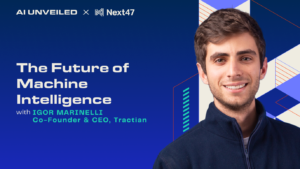
Next47 Partner Vivian Cheng guest hosts this episode of AI Unveiled and speaks with Erez Druk, the Co-Founder and CEO of Freed, a rocket ship AI startup dedicated to transforming the lives of healthcare professionals. Freed has grown at breakneck speed, reaching $10 million in ARR in its first year. Its mission is to free clinicians from the burden of manually managing electronic health records (EHR), allowing them to focus on patient care rather than paperwork.
Erez was inspired to found Freed after watching his wife, a clinician, struggle with seemingly endless hours needed to keep up with administrative tasks. Burnout is rampant in the healthcare industry, so Erez saw Freed as the way to give physicians their time (and lives) back. Erez is a second-time founder and learned quickly that having a deep connection to the pain point he’s working to resolve has made all the difference in building a company.
A key theme of this conversation is how to scale a mission-driven company quickly and effectively. In just a year, this startup reached $10 million in ARR and serves over 10,000 clinicians. We discuss the importance of obsessing over user needs, building a simple and effective product, how to hire the right people, and timing your entry into the market.
Timestamps
* 8:19 – Finding product-market-fit
* 11:13 – How Freed’s AI scribe stands out in a highly competitive space
* 17:27 – Who you hire can make or break your company
* 21:12 – Lessons learned as a second-time founder
Highlighted Excerpts:
VIVIAN: What is one of the biggest learnings from your previous startup?
EREZ: You need to make sure you have a reason to obsess about a user and the right to access to that user. Really pick your users carefully, more than the problem, more than the market.
EREZ: No matter which industry and what situation, if you have truly a deep pain and truly a 10x, a true solution for that pain, that’s going to lead to adoption. That is really the core of everything.
And when you have a pain where, I can see writing notes is the number one pain point clinicians and doctors have in their lives. It’s not just in work, it literally ruins their lives. Sometimes to the brink of suicide, as we mentioned. And we built a solution that is 10x better because of the technology wave, not because we’re geniuses. Even in healthcare, at the end of the day, it’s humans who want a better life, want to enjoy what they’re doing, want to not type all day long.
So I think that’s really the secret sauce, that humans need help. And if you help them with something big in a meaningful way, [product-market-fit] would work in every industry at the end of the day.
EREZ: I think there are three types of startups in the world. Type number one is most startups, and those are startups that never reach product market fit. Those startups ultimately die no matter what you do. Maybe they’ll get acquired, but you have to find a product market fit. That’s a necessary step in the life of a startup.
The second type of startup is one that finds a product market fit. And then they, let’s say squeeze the lemon to some level of success. Sometimes growing into a huge company you don’t always need.
But I think the most inspiring type of startups are startups that can know how to keep the lightning hitting, of know how to find product market fit here and then adjacent product market fit and solve another problem. And I think this is what the greatest companies know how to do. And the big challenge for me is to go from being the second category company, which that’s what we are today, to the third.
And I think being successful at this transition will be the deciding factor, whether it gets sold in a couple of years or become a much more durable and big and longer term company.




